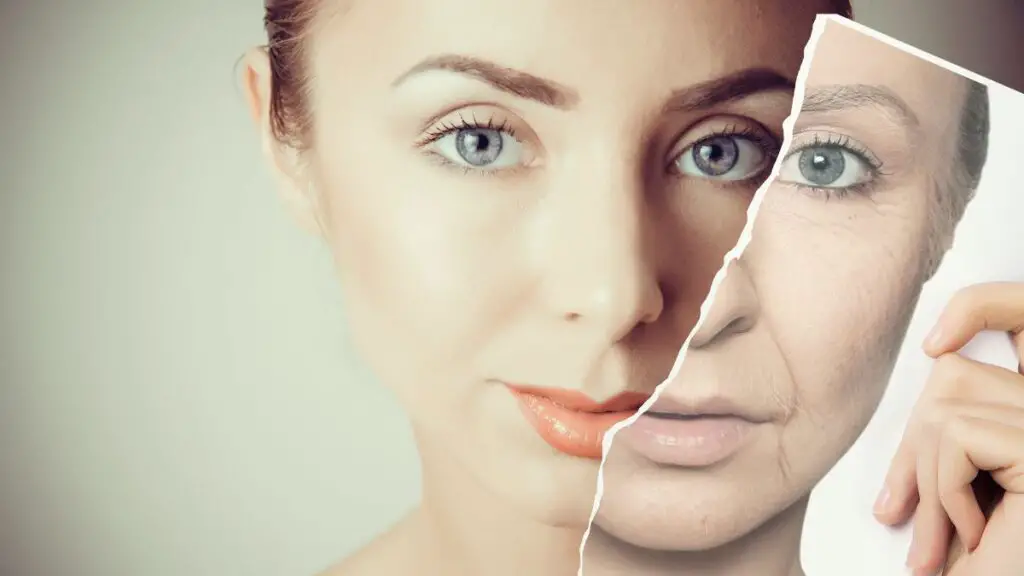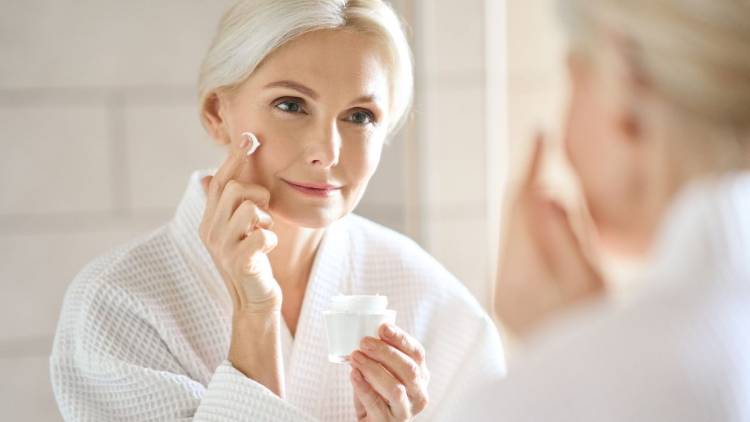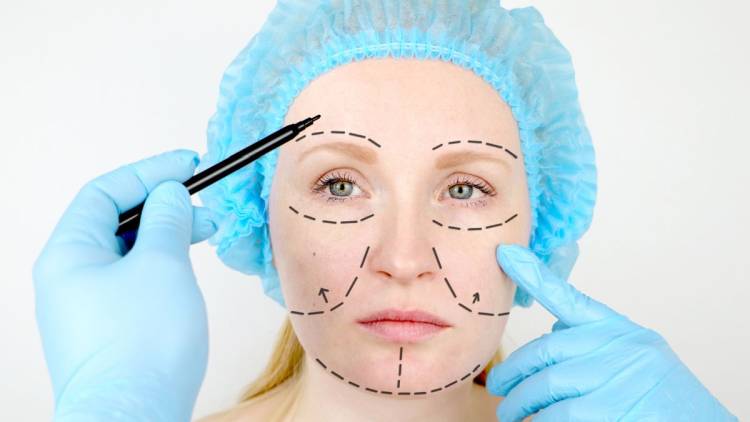The best-looking skin is healthy skin, but our health declines with age and with it the quality of our skin. Aging skin warrants different care than young skin does. In this article we’ll examine what those strategies are.
We owe so much of our looks to the food we eat and to the way we live, yet we look in the mirror and wonder, “What has happened to my skin?” As we age, the skin quality, elasticity, and flexibility change, and it is up to us to protect the skin we have today and enjoy a younger-looking face tomorrow. Needless to say, it all starts with a good lifestyle.
What Happens to Skin as We Age?
People usually talk about genetics as the sole factor determining your looks at a mature age. The truth is that, while genetics is important, there is nothing as strong as 40 years of good or bad habits and the way they influence your skin. If you are prone to alcohol, have a bad diet, and have a sedentary lifestyle, these changes will be visible on your skin.
The same goes for avid swimmers and sun-bathers. With years of neglect and constant exposure to the sun’s harmful rays, the negative effects on the skin can be felt as early as in your thirties. During your lifetime, the sun will necessarily harm delicate collagen and elastin found in your skin. The body can then repair some damage, but never all of it. Whatever remains accumulates during our lifetime.
Add to this a stressful lifestyle, junk food, and a lack of exercise, and you’ve got yourself signs of aging. Deep, inset lines on the forehead, around the eyes and the mouth, sun spots, and thin, dry, sometimes flaky skin are all signs that your skin got damaged and that it needs repairing. For this reason, let’s consider some skin care advice from experts.
What Causes Aging Skin?
Aging skin is caused by more than just our number of birthdays. Your skin is there to protect you from the elements. It is a protective barrier around your body that prevents harmful rays, viruses, and bacteria from entering your body. It is also the only barrier you have against cold and warm weather, rain, and wind. Clothes aside, skin is the most important protective barrier you could ask for.
All this work that the skin does leaves marks on it, even leading to photoaging. Your skin protects you from the sun and gets red or tanned in doing so. It protects your organs from harm and is left with scars for a lifetime. Years of exposure causes skin damage can easily be mended or at least soothed for as long as you know how to take care of mature skin.
Skin Care for Mature Skin – Women
Speaking of taking care of mature skin, you should remember that the skin of a woman and of a man are not the same. While essentially the same organ, women have more delicate skin, which is more prone to fine wrinkles and sun damage than that of a man. For this reason, women may need to start their skincare routine earlier in life, even in their teens, according to some dermatologists.
Clean
At such a young age, learning how to properly clean your skin is essential. Removing daily impurities is usually done with water and mild soap or other skin washes designed for seniors. Makeup, on the other hand, demands a more thorough approach: after cleaning your skin with soap and water, (always) pat dry and continue with a makeup remover. Follow this with a cleanser and skin tonic, and you are good to start applying other skincare steps.
Exfoliate
After cleaning your face, once or twice a week, you should exfoliate your skin. Never exfoliate with mechanical peels, as they can be too abrasive and even deepen the wrinkles you already have on your face. To prevent this from happening, always aim for a high-quality fruity acid or another form of chemical peel. To ensure safety, always read the instructions and never over apply.
Moisturize
The next step is moisturizing the skin. Your skin is an organ that was made to sweat – this is how it helps regulate your body temperature. However, as it removes extra heat from the body, the skin gets dry and is prone to cracking and wrinkle formation. To avoid this, always use a good medically-tested moisturizer. Apply day and night, and you should be able to see the first results within a week or so.
Nourish
After the first three steps, it is time to start nourishing the skin. There is topical nourishment, which is applied to the skin, and there is systematic nourishment, usually taken in the form of supplements. Understand which types of skin care supplements you need, and invest into:
- Antioxidants,
- Hyaluronic Acid,
- Retinols, and
- Vitamins A, C, E.
Protect
However important skin nourishment is, it is even more important to know how to protect your skin from harmful environmental factors. Sun, cold, and wind all damage your skin. For this reason, always wearing protective clothing appropriate for the season is so important.
Another thing that you should never leave your house without is sunblock – aim for an SPF of at least 50 and never spare a dime on high-quality mineral-based sunblock.
Lifestyle
As we are young, we do not even understand what consequences our lifestyle can have on our bodies. However, as you age, you should know that the same types of consequences that your body experiences can be felt on your skin, too, although it may take another decade to see the first results. To limit these effects, always choose healthy, non-inflammatory foods and plenty of exercise.
Skincare for Mature Skin – Men
Skincare routine for men, on the other hand, is a different issue. As men’s skin is thicker and more resilient to sun damage, it needs a different kind of care and nourishment compared to that of ladies. This should not say that men should not take care of their skin and take preventative measures to ensure it stays healthy for longer.
Clean
Cleaning your skin twice a day at least is a must. Using a gentle soap (preferably a liquid soap for the face) ensures that all the dirt and gunk are removed from your pores.
Next, you should also clean your face thoroughly whenever you return from a trip or any other dusty place, such as your barn, the garage, or even after mowing your lawn or doing woodwork. This will ensure that your skin can breathe and release all toxins that have been building up – which is its primary purpose.
Exfoliate
Men need to exfoliate as well. As men have thicker skin than women, needless to say, there will be more dead skin cells at the end of each day. Unlike ladies, men should exfoliate 2-3 times per week, preferably using a chemical peel rather than a mechanical one. This will prevent deep wrinkles and any bumps on your skin from appearing.
Moisturize
Moisturizing is the next logical step. As men sweat a lot during the day, they need a lighter moisturizer for the day but a heavier one in the evening. Medical-grade moisturizers can be purchased at your local pharmacy, but you should consult with your dermatologist first – after all, different skin types require different care.
Nourish
Nourishing your skin is especially important for men. As men spend more time outside, especially in nature, and doing sporting activities, sparing the skin from all oxidants that build up during the day is essential for good skin function and youthful looks.
Do not forget that nourishment comes from the plate first, supplements second, and then from skincare products for men. They should all include:
- Antioxidants,
- Hyaluronic Acid,
- Retinols, and
- Vitamins A, C, E.
Protect
Protecting your skin from the sun is a no-brainer. In fact, the sun causes as much damage to the skin as smoking. For this reason, you should always have a good sunblock on your skin – SPF 50 or even higher should do the trick. Apply it to your face, your neck, chest, and forearms. Reapply throughout the day, especially after sweating profusely and swimming.
Lifestyle
Mild changes to your lifestyle can have a big say in the quality and the looks of your skin. Eating in restaurants and finishing every weekday with a round of beer is not good for any of your organs, skin included. For this reason, you should:
- Start sleeping more,
- Start eating more fruits and vegetables,
- Limit meat consumption,
- Limit dairy consumption,
- Start exercising more, and
- Limit alcohol intake to no more than two drinks a day.
Non-Surgical Treatments
In case you can still see signs of aging, such as wrinkles, sun spots, and loose, saggy skin, it may be time to consider other treatment options as well. Laser skin resurfacing and tightening, skin bleaching, PRP treatment, and collagen injections are all there for you. Always consult a dermatologist, and do not forget to always have your treatments in a clinic, rather than opting for cheap deals and risking ruining your skin.
Surgical Treatments
Past the age of 60, nonsurgical treatments for skin rejuvenation may have a limited effect on how well your skin looks and how well it handles the stresses of everyday life. For this reason, you may want to consider speaking to a plastic surgeon about any concerns you may have. You may want to consider getting:
- Baby facelift,
- Full facelift,
- Eyebrow lift and forehead tightening,
- Double chin removal,
- Neck lift,
- Eyelid reduction/lift,
- A lower eyelid lift, and many more.
Your dermatologist and your surgeon will be able to give you advice on which skin procedure is the best for you.
Final Considerations
Vibrant and young skin at an old age is the dream of many. It takes a lot of care and protection over a long period of time to keep the skin looking young and fresh. The biggest catch with the skin is that the earlier you start caring for it, the longer it will stay youthful and plump. Never forget to always consult your doctor or your dermatologist if you want to start any treatments on your own.
What works for you? Let us know in the comments section.




